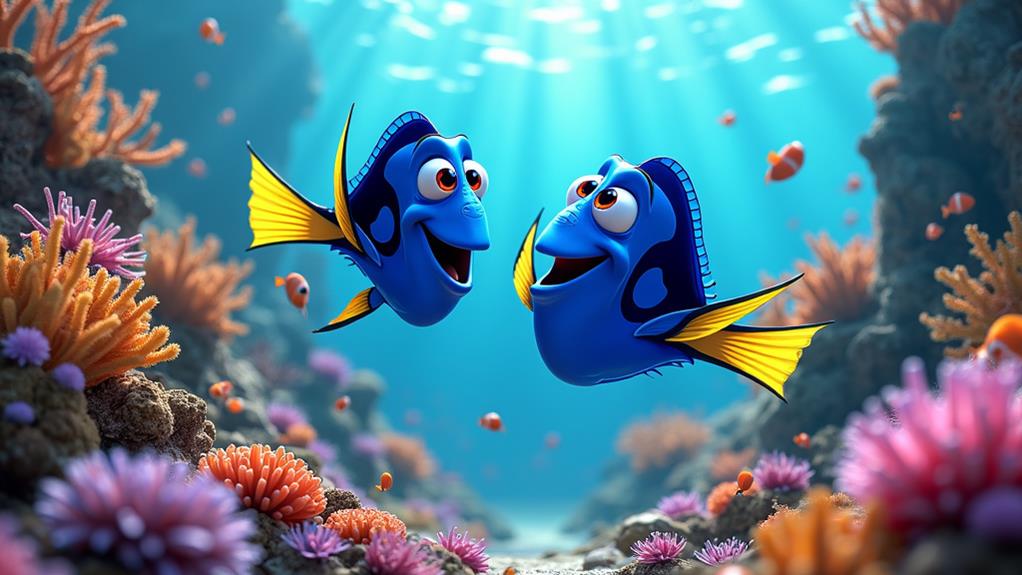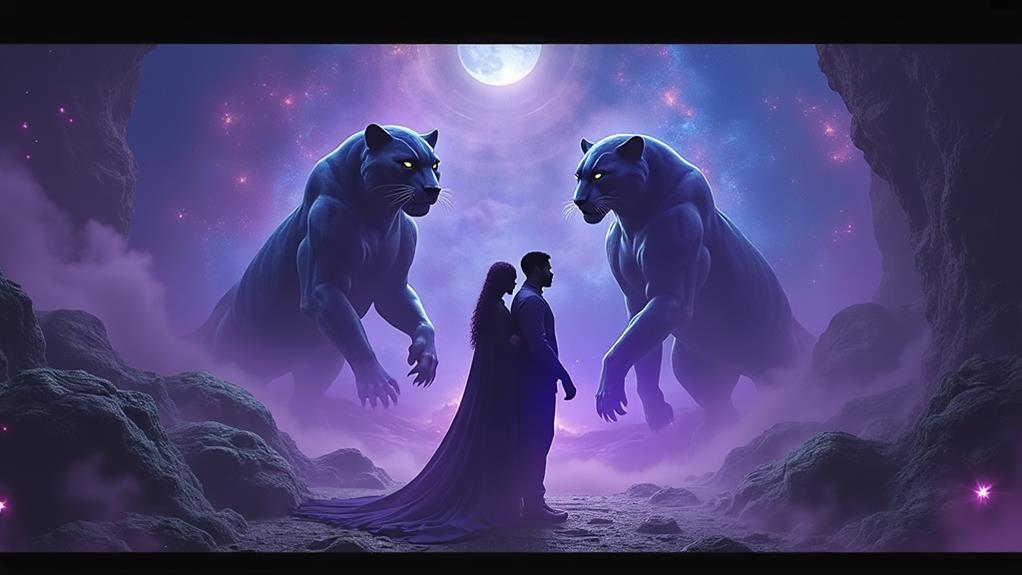Top 10 Emotional Father-Son Films That Will Tug at Your Heartstrings

When you think about emotionally charged father-son films, certain titles stand out for their ability to deeply resonate with audiences.
Whether it's the timeless expedition of self-discovery in "The Lion King" or the heart-wrenching struggles depicted in "The Pursuit of Happyness," these movies offer more than just entertainment; they present layers of legacy, sacrifice, and emotional growth.
Each film on this list uniquely portrays the intricate bond between fathers and sons, but what makes these narratives so compelling?
Let's explore why these particular stories have the power to leave a lasting impression.
The Lion King (1994)
The Lion King (1994) is a landmark in animated cinema, offering a profound exploration of father-son relationships. The bond between Simba and his father, Mufasa, is central to the narrative, resonating deeply with audiences of all ages. Mufasa's wisdom and guidance help young Simba understand his place in the world, emphasizing values of courage and leadership within the "circle of life."
The film's emotional depth is further enhanced by its memorable music, particularly the Academy Award-winning song "Can You Feel the Love Tonight," composed by Elton John and Tim Rice. This music enriches the storytelling, making the father-son relationship even more compelling.
When tragedy strikes and Mufasa is lost, Simba embarks on a journey of self-discovery and acceptance. The emotional turmoil experienced by Simba as he grapples with his father's legacy and his own destiny is palpable.
The Lion King's lasting impact, from its critical acclaim to its various adaptations, solidifies it as a timeless tale of love, loss, and the enduring bond between father and son.
The Pursuit of Happyness (2006)
The Pursuit of Happyness (2006) is a compelling story of resilience and determination, based on the true-life experiences of Chris Gardner. The film depicts his battle with homelessness while striving to secure a better future for his son, Christopher. Will Smith delivers a powerful and nuanced performance as Chris, capturing the emotional journey of a father fighting against all odds to ensure his son's well-being.
Central to the film is the deep bond between father and son. Moments of love, sacrifice, and unyielding hope punctuate the narrative, illustrating the extent to which a parent will go for their child's happiness.
Gardner's relentless determination to overcome each obstacle underscores the film's portrayal of the challenges of single parenthood, making every small victory feel monumental.
Critically acclaimed, The Pursuit of Happyness earned Will Smith an Academy Award nomination for Best Actor and grossed over $300 million worldwide.
More than just a personal triumph, the film attests to the power of perseverance and parental love. Watching it invites reflection on the enduring strength of the human spirit and the profound impact of a father's unwavering support.
Finding Nemo (2003)

Pixar's Finding Nemo delves into an emotional and adventurous tale where Marlin, a devoted clownfish father, embarks on a perilous journey to find his lost son, Nemo.
The film begins with a tragic scene where a barracuda attack results in the loss of Marlin's wife and most of their eggs, leaving him fiercely protective of his only surviving child. This sets the stage for a touching exploration of a father's love and the lengths he'll go to ensure his son's safety.
As Marlin ventures through the vast ocean, he's joined by Dory, a forgetful yet endearing royal blue tang, whose humor and optimism enrich the narrative. Their journey is fraught with danger, but it's Marlin's unwavering determination and love for his son that form the emotional core of the story.
The film's success, winning the Academy Award for Best Animated Feature and grossing over $940 million worldwide, underscores its powerful resonance.
Finding Nemo beautifully illustrates the bond between father and son, highlighting themes of family, perseverance, and self-discovery. Its stunning animation and heartfelt storyline continue to resonate deeply, making it an unforgettable cinematic experience.
Big Fish (2003)
Tim Burton's Big Fish takes you on an enchanting journey through the extraordinary and often exaggerated tales of Edward Bloom. In this 2003 film, Burton skillfully combines magical realism with emotional depth, creating a world where the lines between reality and fiction blur.
The film centers on the strained relationship between Edward and his son, Will. Edward, portrayed by Ewan McGregor and Albert Finney at different life stages, is known for his fantastical storytelling, which leaves Will questioning the truth behind his father's tales.
As Edward's health declines, Will embarks on a quest to uncover the reality behind the stories, seeking reconciliation and a deeper understanding of his father's legacy.
Through its imaginative visuals and poignant narrative, Big Fish explores how memories and stories shape our perceptions of loved ones.
The film's themes of truth, legacy, and the power of storytelling resonate deeply, making it a standout in the genre of emotional father-son films.
Danny Elfman's Academy Award-nominated score enhances the film's magical and heartfelt atmosphere, ensuring it leaves a lasting impression.
He Got Game (1998)

Anyone who's seen Spike Lee's He Got Game (1998) knows it's more than just a sports drama—it's a powerful exploration of redemption and the complexities of father-son relationships. Starring Denzel Washington as Jake Shuttlesworth and Ray Allen as his son, Jesus, the film delves deep into the emotional journey of a father trying to reconnect with his son amid the pressures of college basketball recruitment.
Jake, incarcerated for the accidental murder of his wife, is given a unique chance at redemption: if he can persuade Jesus, a highly sought-after basketball prodigy, to sign with the governor's alma mater, his sentence might be reduced. This sets the stage for an emotionally charged reunion, where themes of legacy, loyalty, and the consequences of past choices unfold.
The film's emotional core revolves around the father-son dynamic, showcasing Jake's struggle to make amends and Jesus's battle with societal expectations. The poignant showdown on the basketball court captures their complex relationship in a raw, heartbreaking manner.
| Theme | Character | Emotional Impact |
|---|---|---|
| Redemption | Jake | Struggles with past |
| Legacy | Jesus | Faces high expectations |
| Father-Son | Both | Emotional reunion |
| Consequences | Both | Impact of choices |
The soundtrack, enriched by hip-hop contributions, amplifies the film's cultural relevance, making He Got Game a timeless classic.
The Road (2009)
Amid the bleak and desolate landscape of a post-apocalyptic world, The Road (2009), directed by John Hillcoat, offers a harrowing yet deeply moving portrayal of a father and son's unbreakable bond.
Based on Cormac McCarthy's Pulitzer Prize-winning novel, this film explores the emotional depth of their relationship as they navigate a world devastated by an unspecified cataclysm.
Viggo Mortensen stars as the father, whose primary motivation is to protect his young son from the numerous dangers they encounter. The narrative is rich with themes of love, sacrifice, and survival.
Their journey reflects the lengths a father will go to ensure his child's safety and well-being, even when hope seems all but lost.
Here are four reasons why The Road stands out:
- Emotional Depth: The film delves deeply into the psychological and emotional struggles of the characters.
- Sacrifice: The father's relentless drive to safeguard his son, often at great personal cost, is profoundly moving.
- Cinematography: Javier Aguirresarobe's work captures the haunting beauty of the barren landscape, amplifying the emotional impact.
- Critical Acclaim: The film received praise for its performances and was nominated for an Academy Award for Best Adapted Screenplay.
The Road is a must-watch for anyone moved by stories of enduring paternal love.
Life Is Beautiful (1997)

Life Is Beautiful (1997), an Italian masterpiece directed by and starring Roberto Benigni, masterfully combines humor and tragedy to tell the poignant story of a father's love during one of history's darkest periods.
Benigni portrays Guido Orefice, a Jewish father who employs humor and imagination to shield his son from the horrors of a Nazi concentration camp during World War II.
The father-son relationship in "Life Is Beautiful" is profoundly moving. Guido's playful antics and unwavering optimism create a protective bubble for his son, insulating him from the grim realities of their situation.
The film's emotional impact is undeniable, resonating deeply with viewers. Its poignant tagline, "A story of love that goes beyond the horror," encapsulates its central themes of resilience and hope.
"Life Is Beautiful" received critical acclaim, winning three Academy Awards, including Best Foreign Language Film, and earning Benigni a Best Actor nomination.
With its seamless blend of comedy and tragedy, this 116-minute classic remains a timeless exploration of love and sacrifice, making it an essential part of any discussion on emotional father-son films.
A River Runs Through It (1992)
A River Runs Through It (1992), directed by Robert Redford, eloquently explores familial bonds and the quest for connection set against the early 20th-century Montana landscape. Adapted from Norman Maclean's semi-autobiographical novella, the film delves deeply into the complexities of family relationships, particularly between two brothers and their father.
The narrative skillfully intertwines the art of fly fishing with themes of spirituality and personal struggle. Philippe Rousselot's Academy Award-winning cinematography enhances the film's emotional impact, rendering Montana's landscapes as a significant and almost sentient presence.
Key elements include:
- Father-Son Dynamics: The nuanced relationship between the Maclean brothers and their father illustrates how love and discipline shape their lives.
- Brad Pitt's Performance: Pitt's portrayal of Paul Maclean brings charm and tragedy, leaving a lasting impression on the audience.
- Reflective Voiceover: Norman Maclean's narration underscores the enduring influence of family memories.
- Nature's Role: The natural scenery and fly fishing metaphorically reflect life's challenges and connections.
"A River Runs Through It" masterfully portrays the enduring bonds of family and the profound depth of father-son relationships.
Black Panther (2018)

In "Black Panther (2018)," T'Challa grapples with his father's legacy and the responsibilities it entails. The film explores how loss shapes both T'Challa and Erik Killmonger, emphasizing their different approaches to reconciliation.
Through their father-son dynamics, the movie illustrates the profound impact of understanding one's heritage on identity and leadership.
Legacy and Responsibility
Navigating the daunting legacy left by a revered parent, Black Panther (2018) intricately examines the weight of responsibility that T'Challa faces as he steps into his father's role. The film delves deeply into T'Challa's emotional journey as he grapples with the immense expectations and responsibilities of leadership.
It captures the essence of legacy and responsibility in several key ways:
- Inheriting the Throne: T'Challa's journey begins with the formidable task of succeeding King T'Chaka. The expectations are high, and the burden of continuing his father's legacy is significant.
- Confronting the Past: T'Challa learns that honoring a legacy isn't just about upholding traditions but also about addressing past mistakes. His father's choices profoundly impact his own path.
- Rival Perspectives: The film contrasts T'Challa's upbringing with Killmonger's, highlighting how different perspectives on legacy and responsibility shape their motivations and actions.
- Redefining Leadership: Ultimately, T'Challa's struggle isn't just about preserving his father's legacy but also about forging his own path. He redefines what it means to be a leader and protector of Wakanda.
Black Panther poignantly portrays T'Challa's emotional struggle to balance honoring his father's legacy with the responsibility of creating his own.
Loss and Reconciliation
T'Challa's journey in Black Panther (2018) delves deeply into themes of loss and reconciliation as he grapples with the weight of his father's legacy. The film juxtaposes T'Challa's path with that of Erik Killmonger, highlighting the divergent ways they handle their shared heritage and the emotional impact of their fathers' legacies.
| T'Challa's Expedition | Killmonger's Path |
|---|---|
| Embraces father's legacy | Seeks revenge |
| Pursues reconciliation | Driven by unresolved grief |
| Honors his father's values | Fueled by anger |
| Chooses forgiveness | Chooses vengeance |
While T'Challa seeks to understand and accept his father's values, Killmonger is driven by a desire for vengeance. This contrast underscores the emotional toll of familial loss and the critical importance of reconciliation. The climactic confrontation between T'Challa and Killmonger poignantly illustrates this, as T'Challa ultimately upholds his father's values rather than succumbing to vengeance.
This narrative emphasizes the role of forgiveness and understanding in healing familial rifts. T'Challa's actions demonstrate that seeking reconciliation, rather than revenge, can lead to emotional healing, making Black Panther a profound exploration of father-son dynamics within the context of loss.
Fatherhood and Identity
Fatherhood and identity intertwine profoundly in Black Panther (2018), where T'Challa's relationship with his father, King T'Chaka, shapes his path as a leader. As T'Challa ascends the throne, he grapples with the weight of his father's legacy and the immense responsibility of ruling Wakanda. T'Chaka's influence is inescapable, guiding T'Challa through decisions that affect not only his kingdom but the world.
T'Challa's struggle with his identity is central to the film, and he faces the challenging task of balancing his father's values with his own vision for the future. This journey is marked by several crucial moments:
- Confronting T'Chaka's Spirit: T'Challa seeks guidance from his father's spirit, emphasizing the emotional weight of loss and the significance of familial bonds.
- Uncovering Past Decisions: Learning about T'Chaka's past choices forces T'Challa to reconcile his father's actions with his own moral compass.
- Honoring the Legacy: T'Challa endeavors to honor his father's legacy while forging his own path as a just ruler.
- Global Responsibility: He navigates the complexities of Wakanda's isolationist policies and global involvement.
Ultimately, the film's exploration of father-son dynamics showcases themes of reconciliation and personal growth, making it a poignant tale of fatherhood and identity.
Boyhood (2014)
In Boyhood (2014), you'll experience a groundbreaking real-time filming technique that chronicles Mason's journey from childhood to adulthood over 12 years.
The evolving father-son relationship between Mason and his dad, portrayed by Ethan Hawke, is central to the narrative.
This film authentically captures their bond, highlighting the profound influence of love, support, and parental guidance.
Real-Time Filming Approach
Capturing the essence of real-life maturation, Boyhood (2014) employed a groundbreaking real-time filming approach that spanned 12 years, showcasing the genuine evolution of its characters. This unique method involved filming a few days each year, allowing the cast to age naturally and enhancing the authenticity of the relationships depicted.
As you watch, you'll notice how this approach adds layers of depth to the emotional narrative, making the characters' growth feel remarkably genuine.
Director Richard Linklater envisioned a relatable coming-of-age story, focusing on the everyday experiences of a boy growing up, with his father's influence as a recurring theme. This inventive technique not only garnered critical acclaim but also offered a fresh perspective on storytelling.
The film effectively illustrates the complexities of father-son relationships, capturing moments of growth, conflict, and bonding.
Here are four key aspects that make Boyhood stand out:
- Real-time maturation: The cast ages naturally over 12 years.
- Authenticity: Genuine portrayal of evolving family dynamics.
- Relatable storytelling: Focus on everyday experiences and emotions.
- Critical acclaim: Recognition at major award ceremonies like the Golden Globes and Academy Awards.
Childhood to Adulthood Journey
Boyhood (2014) is a unique cinematic journey that chronicles Mason's transformative expedition from childhood to adulthood. Directed by Richard Linklater and filmed over 12 years, the movie captures the passage of time like no other.
You'll watch Mason evolve from a dreamy-eyed boy into a reflective young adult, all against the backdrop of his ever-changing relationship with his father, played by Ethan Hawke.
This father-son narrative is both emotional and captivating, highlighting critical life moments that shape Mason's identity. Through school changes, family dynamics, and personal challenges, you witness the raw, unfiltered growth of a boy into a man.
The film's groundbreaking storytelling and emphasis on real-life experiences resonate deeply, making it a poignant exploration of growing up.
"Boyhood" doesn't shy away from the complexities and nuances of Mason's bond with his father. Instead, it embraces them, showcasing the emotional highs and lows that define their relationship.
With its realistic portrayal and award-winning performances, "Boyhood" stands out as a moving depiction of the passage from childhood to adulthood.
Father-Son Dynamics
Exploring the father-son dynamics in "Boyhood" offers a profound look into the evolving relationship between Mason and his dad. Directed by Richard Linklater and shot over 12 years, the film captures Mason's emotional journey from childhood to college. Through Mason's interactions with his father, played by Ethan Hawke, the film portrays a realistic and heartfelt evolution of their bond.
Key Aspects of the Father-Son Relationship in "Boyhood":
- Authentic Growth: The 12-year shooting period allows viewers to see Mason and his father aging naturally, providing an authentic depiction of their changing relationship.
- Parental Influence: Mason's father significantly shapes Mason's identity, highlighting the emotional impact of paternal guidance on his life.
- Evolving Dynamics: As Mason matures, his interactions with his father transition from playful and light-hearted to deeper, more meaningful conversations about life and future aspirations.
- Realistic Challenges: The film addresses the complexities and struggles within their relationship, making it relatable and emotionally resonant.
"Boyhood" received critical acclaim, including a Golden Globe for Best Motion Picture and six Academy Award nominations, underscoring its impactful portrayal of family dynamics.
Conclusion
Journey through tales that highlight the profound bond between fathers and sons. Each film, from "The Lion King" to "Boyhood," offers a unique glimpse into the joys, challenges, and triumphs of these relationships. They underscore the importance of love, sacrifice, and emotional growth. Whether you're seeking inspiration or a heartfelt story, these movies will tug at your heartstrings and leave a lasting impression. So grab some popcorn and let these touching narratives move you.




